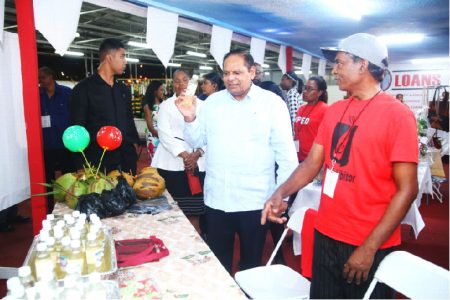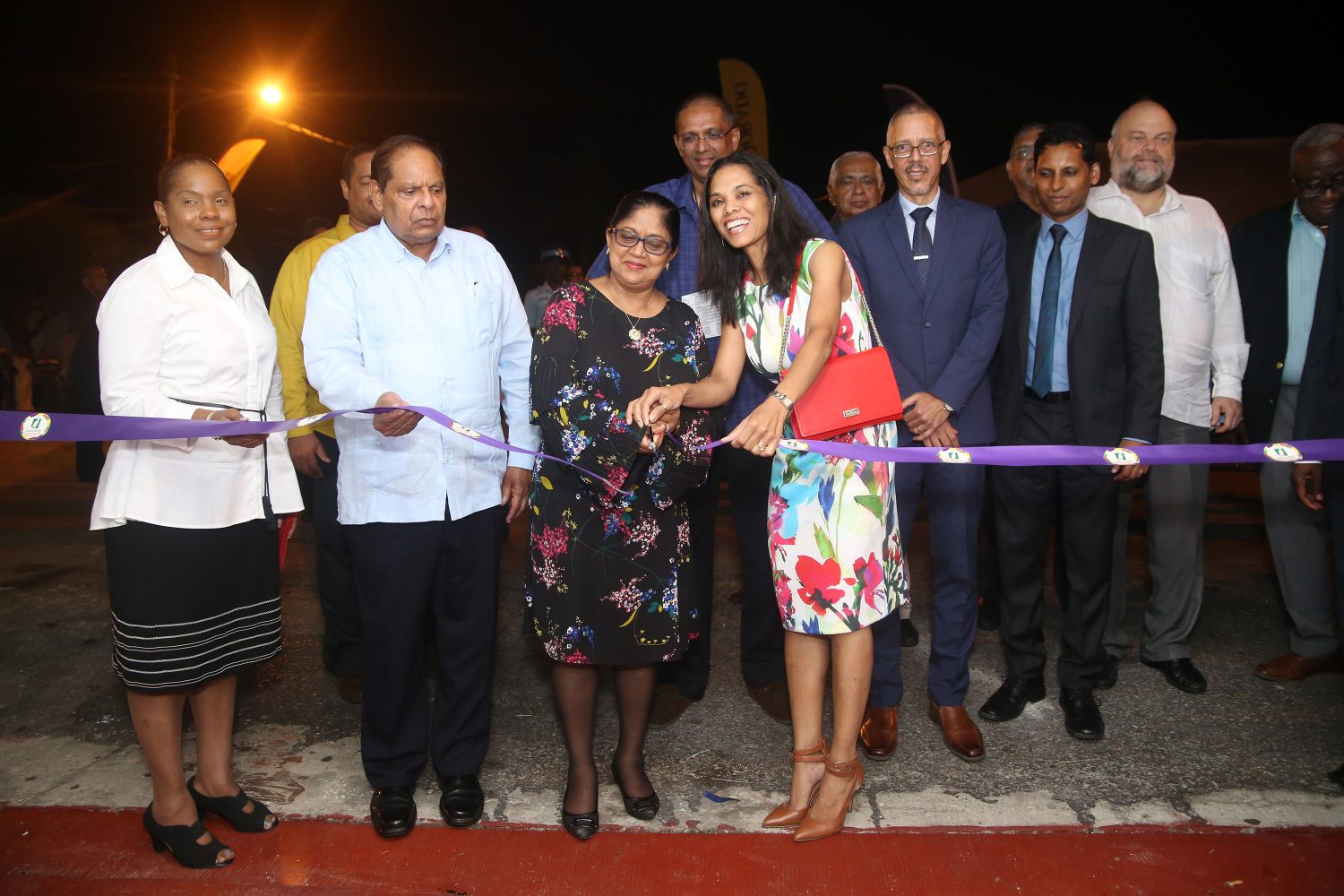Guyanese Flavour UNCAPPED, an agro processers’ exhibition and food festival, opened last evening at the Sophia Exhibition Centre, where calls were made for a greater partnership between the state and the private sector in light of fears that a climate of “political instability” will affect business.
The expo, hosted by the Guyana Manufacturers and Services Association (GMSA) in collaboration with the Ministry of Agriculture, brings together agro processors from across the country to allow the showcase of produce, facilitate networking and information sharing, and encourage business, President of the GMSA Shyam Nokta explained last evening.
In Nokta’s address, he related that the private sector is “committed to doing more” but said that an enabling environment is needed. He had begun his presentation by outlining the limitations within the local agro processing sector, naming access to finance, energy, and transportation and technology as barriers.
Nokta went on to suggest possible fixes for promoting growth and efficiency within the sector, among those being a proposal for the establishment of an agro processing facility, which he said would encourage stable supply and improve the economic standing of farmers; the development of an enabling framework to improve investments, which would provide, among other things, measures to reduce tax burdens and offer incentives; working to remove tariffs and providing greater shares of public procurement to local manufactured items that meet quality and standard requirements.

“While these interventions will certainly help to create an enabling environment for investment, they can only succeed if there is political stability. Within the last week, there has been a rise in the political temperature, at a time perhaps when our economy is showing signs of slowing down. The GMSA is concerned about the impact this political uncertainty and fallout can have on our businesses and the wider economy. It does not send the right signals to the private sector and investors both local and foreign,” Nokta said.
Fears
In the Prime Minister Moses Nagamootoo’s feature address, he would address Nokta’s statement, first by committing to circulate a copy of his presentation at the next sitting of cabinet.
“I believe that we need much more of these ideas that could tell politicians in government that we do not have a monopoly on ideas, we don’t have a monopoly on views, neither do we have a monopoly on the approaches that could be taken at any particular time to change the direction in which we are going, or to improve the content of the approach,” Nagamootoo stated.
He would, however, go on to defend the role the government has played in support of the private sector and its services, opining that what Nokta said gives an impression of instability, a view which he said he does not share.
“I do not share this conclusion, but I share his fears. Too much of confrontational politics can affect the stability of our country, but this is a stable democracy, this is a strong democracy, this is a viable parliamentary, multi-party democracy, this is a democracy that boasts of a free and plural media that is kicking and alive and an independent judiciary and an executive that does not interfere with the other branches of the state…,” Nagamootoo said.
He further stated that “political fallouts do not necessarily mean instability”, and acknowledged that claiming such is bad for the business climate.
Meanwhile, Minister of Business Dominic Gaskin noted that there are strong, political divisions in many countries across the world but their economies are still growing and investments are still pushing up financial markets. “But somehow in Guyana, every time there’s some political fallout, it becomes okay to attack our economy. The private sector in other countries certainly mean business and they continue to do business and to seek opportunities, even in the most poisonous political climate. And while it certainly would not be a bad thing to improve the political climate here in Guyana, we’ve been living with this bad relationship for what, at least 60 years now and we cannot let it dominate us to the extent that we allow it to affect the private sector and affect the business confidence,” he added.
Gaskin offered that Guyana’s private sector needs to “remain apolitical” and “enjoy the fruits of the government of the day.”
“Maybe we need to forge stronger unity between the private sector and the state. We should become real partners,” Nagamootoo stated. “
Because the state is the biggest investor in areas that service the private sector…and so therefore, when you look at the input of the state into the economy, into the preparation for business, it is very significant and worthy that the private sector should see the state as a principal friend and as a partner as we move along to diversify and develop our economy,” he stated.
The Prime Minister, therefore, challenged the private sector to step up to the plate, as he spoke of the many ways in which the state already supports the activities of the sector, including in drainage and irrigation, sea defence and other areas.
“…Guyana’s private sector is the largest except the hangover from sugar, and the private sector dominates this economy, except sugar. We should then ask whether our private sector is bold and bullish as it ought to be in an environment that supports the private sector. We may have difficulties in the price we receive for rice, the largest private sector business in Guyana—but we certainly have markets. And with mechanization and with innovation, we could do better, then we don’t have to export bulk rice, bulk paddy, we could diversify…,” Nagamootoo said.
“…And so there’s a challenge that is out for the private sector. That in this situation, you have to take the advantage and run with it. You have a firm lead. Cooperative government. We have challenges and difficulties, but those challenges and difficulties, like a long walk, we could see the end…,” he continued.
“Guyanese Flavour UNCAPPED for me is a journey that we needed to have taken a long time ago. It shows that our private sector is responding not only to the needs of the market, but is telling us that we are prepared to utilise the resources available in Guyana—vast land, fresh water and as Eddie Boyer said—fresh air,” he noted, while further stating that Guyana has “everything it takes” just as long as the right enabling factors exist.






